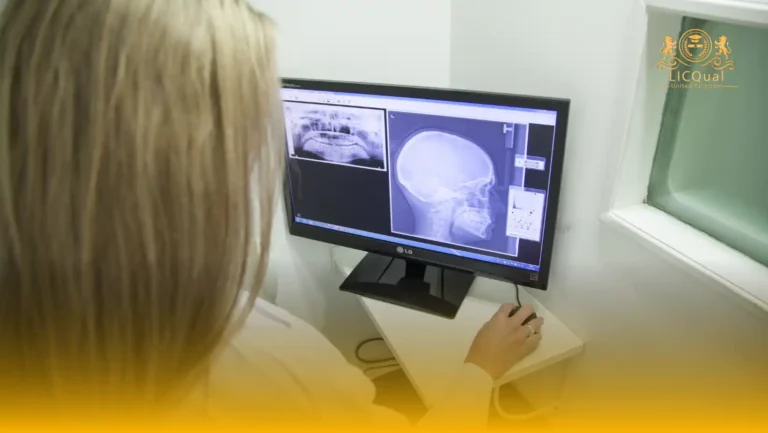The LICQual Level 3 Certificate in Gastroenterology (Cert G) is a specialised qualification designed for healthcare professionals who wish to expand their expertise in the diagnosis, management, and treatment of gastrointestinal conditions. This programme is not intended for fresh candidates but is tailored for experienced practitioners who aim to enhance their career prospects, strengthen their clinical knowledge, and advance their Continuing Professional Development (CPD).
This internationally recognised certificate provides learners with a solid foundation in key aspects of gastroenterology, including digestive system anatomy and physiology, gastrointestinal diseases, diagnostic procedures, therapeutic interventions, and patient-centred care. By completing this qualification, learners will gain valuable insights into evidence-based practices that can be applied in clinical, hospital, or specialist healthcare settings.
Centres delivering this qualification play a vital role in ensuring learner success. To maintain the highest standards of training, centres must have qualified and competent staff, alongside the necessary medical resources, updated learning materials, and effective assessment frameworks. Access to appropriate case studies, clinical references, and laboratory support is essential to provide learners with a comprehensive and practice-oriented learning experience.
The LICQual Level 3 Certificate in Gastroenterology (Cert G) is ideal for medical doctors, nurses, allied health professionals, and other specialists seeking to deepen their understanding of gastroenterology. By undertaking this programme, learners not only advance their professional capabilities but also contribute to improved patient outcomes within the field of gastrointestinal healthcare.
Course Overview
Qualification Title
LICQual Level 3 Certificate in Gastroenterology (Cert G)
Total Units
6
Total Credits
24
GLH
120
Qualification #
LICQ2200849
Qualification Specification
To enroll in the LICQual Level 3 Certificate in Gastroenterology (Cert G) , applicants must meet the following criteria:
|
Qualification# |
Unit Title |
Credits |
GLH |
||
|---|---|---|---|---|---|
|
LICQ2200849-1 |
Fundamentals of Gastroenterology |
4 |
20 |
||
|
LICQ2200849-2 |
Diagnostic Methods in Gastroenterology |
4 |
20 |
||
|
LICQ2200849-3 |
Gastrointestinal Disorders and Diseases |
4 |
20 |
||
|
LICQ2200849-4 |
Clinical Management and Treatment Approaches |
4 |
20 |
||
|
LICQ2200849-5 |
|
4 |
20 |
||
|
LICQ2200849-6 |
|
4 |
20 |
By the end of this course, learners will be able to:
Unit 1: Fundamentals of Gastroenterology
By the end of this unit, learners will be able to:
- Explain the structure and function of the gastrointestinal tract.
- Identify the key roles of digestive organs and systems.
- Describe common gastroenterological conditions and their impact on health.
- Demonstrate an understanding of the basic diagnostic techniques used in gastroenterology.
Unit 2: Diagnostic Methods in Gastroenterology
By the end of this unit, learners will be able to:
- Evaluate the use of endoscopy, colonoscopy, and imaging in diagnostics.
- Interpret laboratory results and biopsy findings accurately.
- Apply knowledge of diagnostic tools to case studies and clinical scenarios.
- Recognise the ethical considerations involved in gastroenterological diagnostics.
Unit 3: Gastrointestinal Disorders and Diseases
By the end of this unit, learners will be able to:
- Analyse the causes, symptoms, and management of peptic ulcers, GERD, and IBD.
- Examine hepatic, pancreatic, and gastrointestinal infectious diseases.
- Assess the role of genetics, diet, and lifestyle in the development of gastrointestinal disorders.
- Discuss approaches to managing chronic and acute conditions effectively.
Unit 4: Clinical Management and Treatment Approaches
By the end of this unit, learners will be able to:
- Evaluate pharmacological therapies used in gastroenterology.
- Explain surgical procedures and their role in gastrointestinal treatments.
- Apply nutritional and dietary management strategies for patient care.
- Collaborate effectively within a multidisciplinary healthcare team.
Unit 5: Preventive Gastroenterology and Public Health
By the end of this unit, learners will be able to:
- Explain the importance of screening and preventive programmes.
- Apply lifestyle modification strategies for reducing gastrointestinal risks.
- Evaluate the impact of public health campaigns on awareness and prevention.
- Recommend evidence-based approaches for early detection and disease control.
Unit 6: Professional Practice and CPD in Gastroenterology
By the end of this unit, learners will be able to:
- Demonstrate ethical and professional standards in gastroenterology practice.
- Apply evidence-based approaches to improve patient care.
- Reflect on the importance of CPD and lifelong learning in professional growth.
- Develop a plan for advancing career prospects within gastroenterology.
The LICQual Level 3 Certificate in Gastroenterology (Cert G) is designed for healthcare professionals who want to specialize in digestive health and gastrointestinal disease management. This Level 3 Gastroenterology certification is ideal for doctors, nurses, allied health practitioners, and medical students aiming to strengthen their expertise in gastrointestinal diagnostics, liver and pancreatic disorders, and evidence‑based treatment. With its globally recognized qualification and CPD‑accredited training, this program is perfect for anyone seeking a career‑boosting certification in gastroenterology.
1. Doctors and Physicians in Gastroenterology
- Gain advanced knowledge in gastrointestinal disease management
- Strengthen credentials with a globally recognized certification
- Learn evidence‑based approaches to digestive health care
- Improve patient outcomes through advanced diagnostics and therapies
- Boost career progression in hospitals, clinics, and research centers
2. Registered Nurses and Endoscopy Staff
- Develop advanced skills in patient monitoring and GI procedures
- Earn a CPD‑accredited qualification to support career growth
- Gain confidence in assisting with endoscopic and diagnostic techniques
- Learn international best practices in gastroenterology nursing
- Increase employability in hospitals, endoscopy units, and clinics
3. Allied Health Professionals (Dietitians, Lab Technicians, etc.)
- Expand scope of practice with gastroenterology competencies
- Learn nutrition and dietary management for digestive health
- Improve patient safety and clinical accuracy in GI care
- Gain recognition with an industry‑approved qualification
- Enhance career mobility across healthcare and nutrition sectors
4. Medical Students and Early‑Career Professionals
- Build a strong foundation in Gastroenterology training
- Gain a competitive edge in postgraduate applications
- Learn practical skills alongside theoretical knowledge
- Demonstrate commitment to professional development
- Position yourself for future roles in gastroenterology and internal medicine
5. Public Health and Community Care Specialists
- Understand the impact of gastrointestinal health on public health
- Learn strategies for community‑based digestive health programs
- Strengthen skills in preventive and holistic GI care
- Support public health initiatives for nutrition and digestive wellness
- Enhance credibility in community and outreach roles
6. Healthcare Administrators and Educators
- Gain insights into the clinical demands of gastroenterology
- Strengthen leadership in staff training and development
- Support institutional compliance with CPD requirements
- Understand international standards in digestive health care
- Enhance credibility as a healthcare trainer or manager
7. International Healthcare Professionals Seeking Recognition
- Earn a career‑boosting qualification recognized worldwide
- Align with global gastroenterology standards and protocols
- Improve employability in international hospitals and clinics
- Access flexible online learning suited to global professionals
- Demonstrate commitment to continuous professional growth
To deliver the LICQual Level 3 Certificate in Gastroenterology (Cert G) successfully, centres must meet strict quality standards to ensure learners receive professional, effective, and practice-oriented training. Approved centres are expected to provide an environment that supports academic excellence, clinical relevance, and professional growth.
Key requirements include:
- Qualified and competent teaching staff with relevant academic credentials, clinical experience, and subject expertise in gastroenterology and related medical sciences.
- Access to up-to-date learning resources, including textbooks, research journals, case studies, and e-learning materials aligned with international healthcare standards.
- Practical training facilities and equipment to support the application of theoretical knowledge to clinical practice in gastroenterology.
- Effective learner support services, including academic guidance, mentoring, and structured feedback systems.
- Reliable assessment systems with fair, transparent, and standardised evaluation methods to measure knowledge and clinical competencies.
- Commitment to Continuing Professional Development (CPD) by ensuring trainers and assessors regularly update their skills and knowledge in gastroenterology.
- Robust administrative systems to manage learner records, progress tracking, and certification in compliance with quality assurance requirements.
- Safe and supportive learning environment that fosters professional ethics, patient-centred care, and evidence-based practice.
By meeting these requirements, centres ensure high-quality training that empowers learners to excel in the field of gastroenterology, advance their careers, and improve patient outcomes.
Assessment and Verification
All units within this qualification are subject to internal assessment by the approved centre and external verification by LICQual. The qualification follows a criterion-referenced assessment approach, ensuring that learners meet all specified learning outcomes.
To achieve a ‘Pass’ in any unit, learners must provide valid, sufficient, and authentic evidence demonstrating their attainment of all learning outcomes and compliance with the prescribed assessment criteria. The Assessor is responsible for evaluating the evidence and determining whether the learner has successfully met the required standards.
Assessors must maintain a clear and comprehensive audit trail, documenting the basis for their assessment decisions to ensure transparency, consistency, and compliance with quality assurance requirements.







